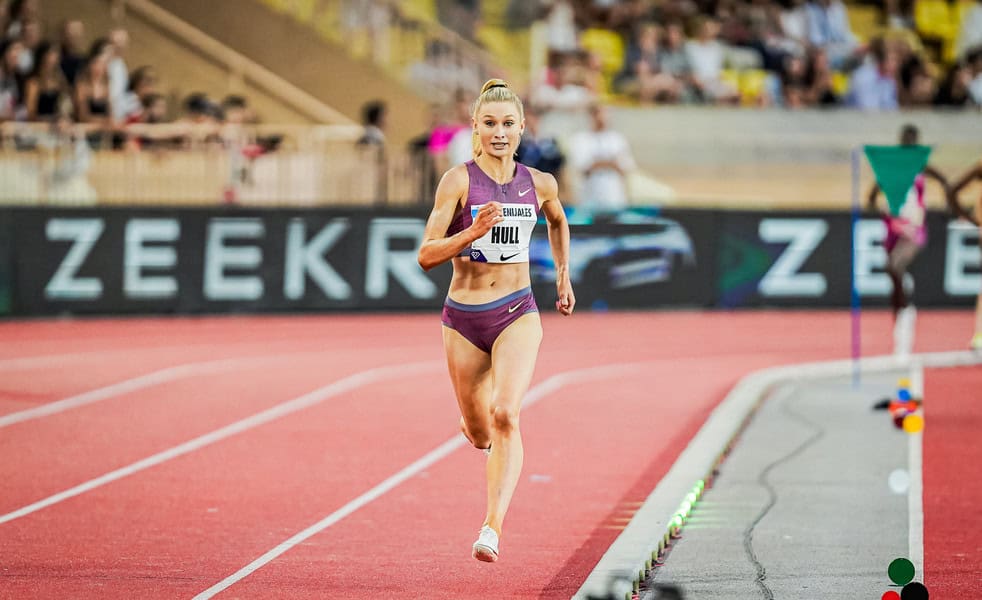When the women’s 800 metres was restored to the Olympic program in Rome in 1960, Australia had immediate success – Brenda Jones taking the silver medal just eight hundredths of a second behind Lyudmila Shevtsova of the Soviet Union.
Success, though not of the medal variety, also came when the 1500 was added to the program in Munich in 1972. Jenny Orr ran a national record in her heat, almost equalled it in the semi-final, and finished eighth in the final.
When do you reckon Australia’s next medal at a global championships in 800 or 1500 came? Despite regular representation and moderate success, it was not until Jess Hull ran second in the Paris24 Olympic 1500 final behind all-time great Faith Kipyegon. And like a long wait for a tram, the next one came along almost immediately with Hull’s 1500 bronze medal at this year’s world championships.
Medals are prized for a reason. They are not easy to get. None more so than medals of the middle-distance variety. The 800 heats are difficult, the semis – where only the first two qualify automatically – diabolical. Basically, all but the sublimely talented must run two flat-out races just to get to the final.
The 1500 tends to be a little easier, especially the fist round. But the semis are just as cut-throat as the two-lapper ones. One false step in the final straight and you get swamped in the rush for the qualifying places not by one or two opponents, but half-a-dozen. We’re sticking to the women’s events here, but our recent male 800-1500 history follows the same pattern of consistent strong results, but no medals.
Brenda Jones and Jess Hull are fine bookends on Australian women’s medal achievements at Olympic and world championships, but there are precious few books in between.

The impetus to go back and check our results came from a request for any information this writer may have had about the training of Jones (now Brenda Carr) and Dixie Willis who also made the final in Rome. After running the fastest time in the heats, she finished last in the final, jogging across the line after a mishap while in medal contention in the final straight.
Not much, was the response. But Carr ran for Melbourne’s Glenhuntly club (my club, too) and the search did unearth a record of an interview with her as part of a club history. In it, Carr mentioned how she had watched Jess Hull’s brilliant running in the lead up to the Paris Olympics and her gallant second in the 1500 final and that she was so proud of the way she trained and focused on her strengths to finally gain her silver medal.
Presumably Carr was a little prouder still to see Hull step down to her distance in Tokyo a couple of months back and reach the 800 final as well as her bronze medal in the 1500. Brenda Jones didn’t have an option of running the longer event back in 1960 but her record at cross-country – two national titles and once runner-up – and regular training visits to Ferny Creek suggest she might have done well.
After Carr and Willis in Rome it was a further 16 years until Australia was represented in the Olympic women’s 800. In Montreal in 1976 both Charlene Rendina and Judy Pollock finished fifth in their semi-finals, missing the final by just one place. The gap in Olympic representation was even longer. Orr’s performance in making the first 1500 final in 1972 was equalled and surpassed by Margaret Crowley when she finished fifth in Atlanta in 1996. Crowley was fighting for a medal in the final straight.
By that time, the world championships had been established and the range of women’s events contested broadened with the addition of the 3000 metres, the 10,000 and the marathon. The Sydney 2000 Olympics saw Tamsyn Manou equal the performances of Rendina and Pollock when she missed the final by just one place. Georgie Clarke and Crowley were semi-finalists in the 1500.
Manou was a semi-finalist again at the Beijing 2008 Olympics, as were Abbey Caldwell and Claudia Hollingsworth at Paris24. Caldwell also made the semis at the Tokyo world championships.
Zoe Buckman, Linden Hall and Georgia Griffith have all been world championships or Olympic finalists in the 1500 over the same period. Buckman loomed as a genuine medal prospect in winning her heat and semi (0.01 to the good of a promising young Kenyan named Kipyegon) at Moscow‘s championships in 2013. She went on to place sixth in the final, Kipyegon a place ahead of her this time.

Hall matched that sixth place in the Tokyo20 Olympics (held in 2021). She, Jenny Blundell and Buckman had all been 1500 semi-finalists in Rio in 2016.
But an Olympic or world medal remained tantalisingly out of reach until Jess Hull’s three minutes 52.56 seconds of silver-tinged glory in the Stade de France at Paris24.
One medal in 64 years of Olympic and world championships competition had at last become two.
And just like that, now, it’s three!